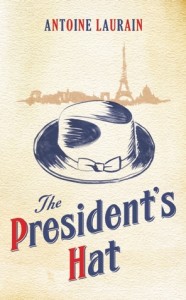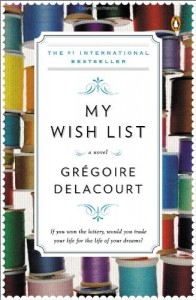Comme le vent (Like the wind)…
I read like the wind — two books over the weekend. Admittedly, they were quite short books, but I seem to have reclaimed my reading mojo.
Both current French fiction with wry Gallic style and observations. (Sorry to admit, I read them translated to English – my French is nowhere near “reading novels” proficient)
The President’s Hat by Antoine Laurain
 Dining alone in an elegant Parisian brasserie, accountant Daniel Mercier can hardly believe his eyes when President François Mitterrand sits down to eat at the table next to him.
Dining alone in an elegant Parisian brasserie, accountant Daniel Mercier can hardly believe his eyes when President François Mitterrand sits down to eat at the table next to him.
Daniel’s thrill at being in such close proximity to the most powerful man in the land persists even after the presidential party has gone, which is when he discovers that Mitterrand’s black felt hat has been left behind.
After a few moments’ soul-searching, Daniel decides to keep the hat as a souvenir of an extraordinary evening. It’s a perfect fit, and as he leaves the restaurant Daniel begins to feel somehow … different.
A french fairy tale of sorts, set during the Mitterrand years (1980s) tells of a hat lost, found and lost again and its magical powers of transformation. This is a fast-paced and whimsical story chock full of French perspective.
Voila – here is President Mitterrand’s hat accidentally left behind for a hapless accountant to snitch and wear out of the restaurant. The hat brings the new wearer confidence and recognition and when he leaves it behind on a train, it is found and worn by a woman needing courage and hope. The hat brings each new finder just what they need to change their lives. Somewhat improbably, all the characters connect in the latter half of the book, and the epilogue cunningly ties everything together and back to the President.
Layered over and under this simple tale is Monsieur Laurain’s fully observed French society of the 1980’s. You are there — when France was still Starbucks free and regular workers could afford a lunch of oysters and crisp white wine. Decades-old class distinctions were just starting to crumble and new political views were taking hold. Neighborhood bistros have not yet evolved into swanky restaurants and an answering machine is new technology.
There are inside observations that will be obvious to the native French but have to be teased out if you’re like me, an unaware American. Who knew that the pronunciation of Mitterrand’s name was code for a French person’s political views? Or that such serious consideration is given to a choice of perfume for both French women and men?
This novel reminded me of an O’Henry or Evelyn Waugh story but with a delightful French twist. At only 200 pages this book goes quickly – and perfect for that picky Francophile on your gift list.
#####################################################
My Wish List by Gregoire Delacourt
 If you won the lottery, would you trade your life for the life of your dreams?
If you won the lottery, would you trade your life for the life of your dreams?
Jocelyne lives in a small town in France where she runs a fabric shop, has been married to the same man for twenty-one years, and has raised two children. She is beginning to wonder what happened to all those dreams she had when she was seventeen. Could her life have been different?
Then she wins the lottery—and suddenly finds the world at her fingertips. But she chooses not to tell anyone, not even her husband—not just yet. Without cashing the check, she begins to make a list of all the things she could do with the money. But does Jocelyne really want her life to change?
This is a sad but thoughtful novella and the author writes with cynicism and sentimentality. A study of contrasts all wrapped up in a winning-the-lottery dream.
Jocelyne is ordinary – really ordinary, but she has hopes, wishes and desires. She is married to a materialistic man, her grown children are a disappointment and her closest friends are silly twins who, unlike Jocelyne, are young, thin and desired. Out of character one day, Jocelyne buys a lottery ticket and somehow predicts to herself that she will win. Thus begin the lists – her lists of things she needs.
When she does actually win the lottery, she hides the win from everyone, doesn’t tell a soul, except her father who is in a nursing home and has a six minute memory span. Her conversations with her father about the money and what she should do, are alternately hysterical and heartbreaking.
Jocelyne fears the change and impact of such riches (18.5 million Euros). She knows her husband wants a flat screen TV, a sports car, and a fancy watch, while Jocelyne’s list includes a new shower curtain and a better reading lamp. As the novel progresses, her lists evolve to include going to a spa and a Chanel bag. She kindly starts to include things her husband would want such as every James Bond Film on DVD.
Jocelyne carries on with her life, she works in a fabric shop and has a very successful crafting blog, but her hidden lottery check is never far from her mind. Soon her lists start to include such sad items as To be told I’m beautiful…and To be envied, at last.
OK, so you think you get it – the lottery win is a metaphor for life and how things of value can’t be bought. But here’s where Monsieur Delacourt doesn’t take the easy road, he lets Jocelyne want her things as badly as her desires. Such as this passage:
“Because our needs are our little daily dreams. The little things to be done that project us into tomorrow, the day after tomorrow, the future; trivial things that we plan to buy next week allowing us to think that next week we’ll still be alive. It’s the need for a nonslip bath mat that keeps us going.”
Jocelyne is the only fully developed character, I couldn’t warm to any of the others, but she is enough to pull the novel along. The novel is told entirely in the present tense, which is a typical for modern-day French novels, and I’m happy the translator didn’t try to adapt the style for English-readers. Here’s a quote from the book that is insight into this author’s unusual writing style:
“I love words. I love long sentences, sighs that go on forever. I love it when words sometimes hide what they’re saying, or say it in a new way.”
I think M. Delacourt gets a few things wrong. Jocelyne’s husband is named Jocelyn which the author introduces slyly, (and it’s important later in the book) but I found it distracting. This male author has Jocelyne (the wife — see, confusing!) viewing her naked overweight body in the mirror and thinking it beautiful. I doubt any overweight woman would do that – maybe French women, but not this American women – perhaps I lack such evolved confidence, but it felt female-false. There is a betrayal and an strangely abrupt bittersweet ending, which I won’t spoil here.
At only 163 pages, this novella packs the import of a much longer novel, I find myself thinking about it still.
Note: The original French title was List of My Desires – which I think would have been a better English title as well.
My Wish List was provided by Penguin via NetGalley





